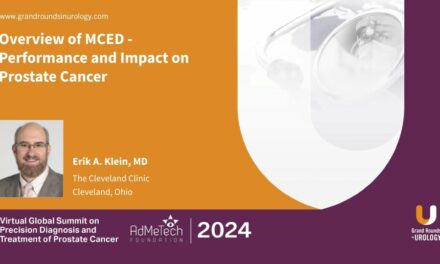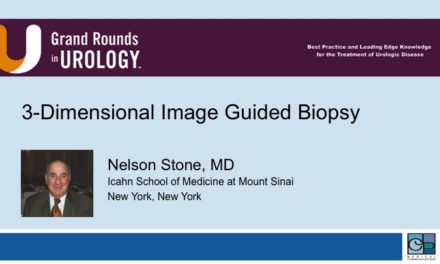Jianfeng Xu, MD, DrPH, presented “Genetic Testing for Identifying Who is at Risk of Prostate Cancer and Lethal Cancer” during the 32nd Annual International Prostate Cancer Update (IPCU32) conference on March 8, 2022, in Snowbird, Utah.
How to cite: Xu, Jianfeng. “Genetic Testing for Identifying Who is at Risk of Prostate Cancer and Lethal Cancer.” March 8, 2022. Accessed Jul 2025. https://grandroundsinurology.com/genetic-testing-for-identifying-who-is-at-risk-of-prostate-cancer-and-lethal-cancer/
Genetic Testing for Identifying Who is at Risk of Prostate Cancer and Lethal Cancer – Summary
Jianfeng Xu, MD, DrPH, Vice President of Translational Research at NorthShore University HealthSystem (NorthShore), the Ellrodt-Schweighauser Family Chair of Cancer Genomic Research, Director of the Program for Personalized Cancer Care (PPCC) at NorthShore, and a Research Professor at the University of Chicago Pritzker School of Medicine, discusses the role of genetic testing in prostate cancer risk identification. Dr. Xu opens by introducing his talking points: Who is really at elevated risk for prostate cancer? What is the relationship among the three inherited risk factors? Can both monogenic and polygenic be tested at the same time? What are key challenges for germline testing? Can we improve the current guidelines for prostate cancer early detection? He addresses the National Comprehensive Cancer Network (NCCN) Guidelines Version 1.2021 for Prostate Cancer Early Detection and highlights the fact that of the three inherited risk factors for prostate cancer (family history [FH], monogenic rare pathogenic mutations [RPMs], and polygenic genetic risk score [GRS]), the guidelines do not yet recommend GRS, even though it is informative to most men, easy to interpret, and its predictive performance is well established in studies. Dr. Xu cites a prospective study of over 200,000 men that suggests GRS complements FH and RPMs for stratifying prostate cancer risk in terms of both incidence and mortality. He then demonstrates how germline testing for monogenic and polygenic can help identify relative risk, lifetime risk, and penetrance. Dr. Xu addresses key challenges for germline testing for RPMs, including the fact that it is unknown which specific gene may be responsible for the increased risk measured by RPMs; he also addresses challenges for GRS, including reliability/calibration and racial disparities in the data. Dr. Xu then states a desire that NCCN guidelines include polygenic GRS in the next revision to reflect evidence from the studies he has cited.
About the 32nd Annual International Prostate Cancer Update (IPCU32):
Presented by Program Chair E. David Crawford, MD, The International Prostate Cancer Update (IPCU), is a multi-day, CME-accredited conference focused on new developments in prostate cancer treatment, diagnosis, and prevention. IPCU 32 featured lectures, interactive discussions, panel roundtables, debates, and case reports. This conference was led by expert physicians and is designed for urologists, medical oncologists, radiation oncologists, and other healthcare professionals involved in the diagnosis and treatment of prostate cancer.
ABOUT THE AUTHOR
Jianfeng Xu, MD, DrPH, is the Vice President of Translational Research at NorthShore University HealthSystem (NorthShore), the Ellrodt-Schweighauser Family Chair of Cancer Genomic Research, Director of the Program for Personalized Cancer Care (PPCC) at NorthShore, and a Research Professor at the University of Chicago Pritzker School of Medicine. Dr. Xu joined NorthShore in the fall of 2014, having previously worked as Professor of Genomics and Personalized Medicine Research, Epidemiology, Cancer Biology and Urology and as the Director of the Center for Cancer Genomics at Wake Forest University Medical Center. Dr. Xu received his medical training at Shanghai Medical University and genetic epidemiology training at Johns Hopkins School of Public Health.
Dr. Xu is an internationally known genomic translational researcher with a background in medicine, public health, and genetic epidemiology. Having worked on genetic studies of cancer and other diseases for over 20 years, he has developed a genetic risk score (GRS) to measure the cumulative effect of multiple disease-associated genetic variants on disease risk. Dr. Xu has received multiple grants from the National Institutes of Health and has published over 300 papers in such journals as the New England Journal of Medicine and Nature Genetics.




